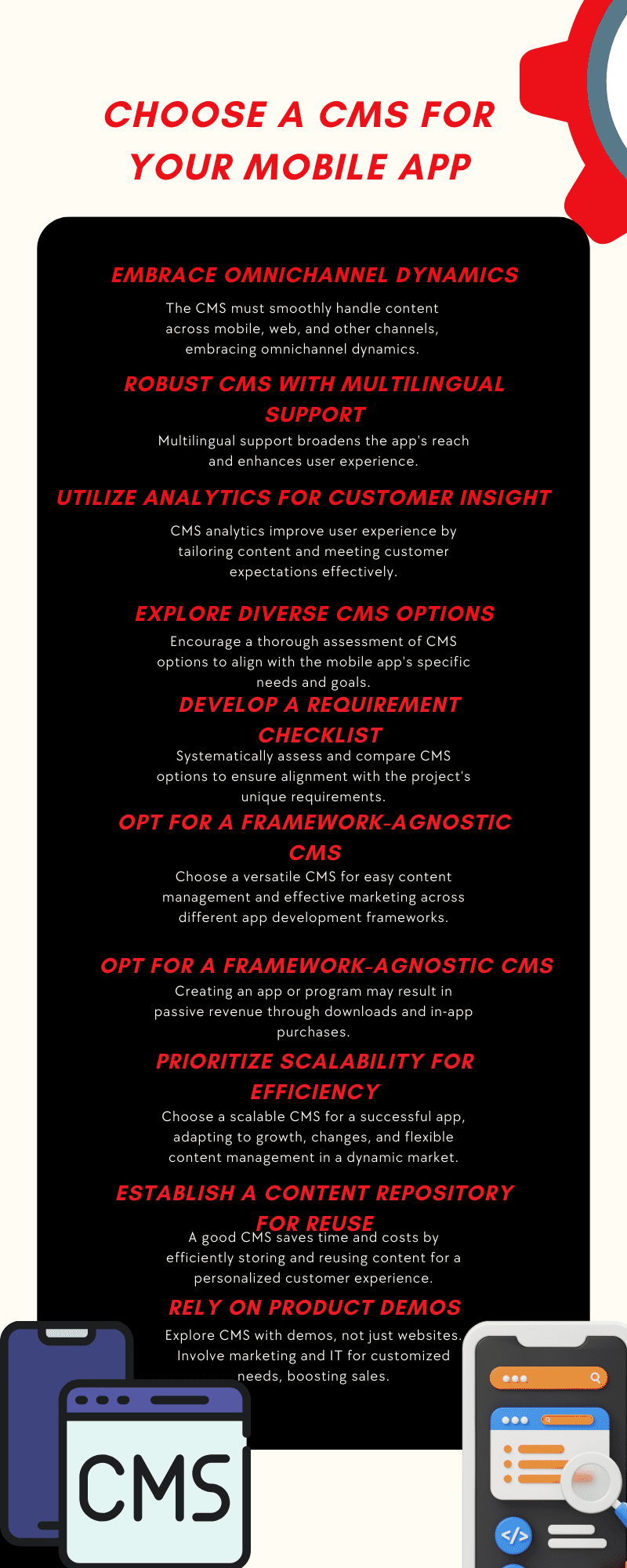Suppose you switched from a desktop website to a mobile device for quicker access, simpler checkout, or improved blog reading. In that case, you’ve seen the advantages of a content management system (CMS), especially the best CMS for mobile apps. Marketing teams commonly use the phrase “mobile CMS.” While customers may need to realize it, these systems connect content creation to delivery across various platforms.
In today’s mobile-centric landscape, having a CMS tailored explicitly for mobile apps is imperative. With over 90% of website visits coming from mobile devices, having the best CMS for content management is more critical than ever.
While optimizing a desktop for mobile viewing may save time, it doesn’t guarantee customer satisfaction. Consumers are less likely to tolerate slower loading times or non-optimized websites.
So, how do you cater to a generation where approximately 61% of users will only return to a friendly website? The solution is selecting a content management system supporting current and future business growth.
What is a CMS for Mobile Apps?
To comprehend the functionality of a CMS for mobile apps, consider the task of publishing content on a website. The content represents the ‘body,’ while elements like design, layout, and formatting, visible to the audience, constitute the ‘head.’
Traditional content management systems link the head and body, which is suitable for single static websites. However, in the current landscape with many devices, the best CMS should function as a central control system, enabling content editing, publishing, and management across various platforms.
Why Choose a Mobile App CMS?
The traditional business model confined to websites and physical stores is evolving. Businesses are adapting to a generation using diverse devices like mobiles, smartphones, and smartwatches to bridge the gap between online and offline experiences. To create a brand journey ensuring customer satisfaction and retention, businesses turn to CMS platforms like WordPress, Hubspot CMS Hub, Joomla, WooCommerce, Drupal, and Wix.
The demand for content across multiple devices, particularly mobile, is escalating. A reliable CMS for mobile apps ensures coherent content display on smartwatches, social media platforms, and mobile devices, enhancing the user experience.
Types of Mobile CMS
In CMS technology, selecting a platform that maximizes your marketing efforts is paramount. There are various types of CMS, including:
API-First CMS (Headless CMS):
Also known as headless CMS, this type is engineered to disseminate content across diverse channels. Adopting an omnichannel approach to business, an API-first CMS stores content in an internal database.
It provides flexibility in managing content and the front end, enabling the creation of interfaces and utilizing APIs to deliver consistent content across websites, apps, smartwatches, connected home devices, and more.
Open Source CMS:
Open-source Content Management Systems like WordPress, Joomla, and Drupal are publicly accessible and editable, supported by the online community. Implementing an open-source CMS requires an in-house development team with the necessary expertise.
While it may offer cost-effective solutions, it necessitates IT support and may pose challenges for marketers to handle independently.
MBaaS as a CMS:
Mobile Backend as a Service (MBaaS) is an effective content management system that allows developers to build an app once and deploy it on various operating systems. MBaaS connects applications to essential resources with security and management controls as a cloud computing offering.
Customizable options include support for multiple platforms and devices, an analysis dashboard, and user interface testing, facilitating app development across different operating systems.
Deconstructing a CMS: Key Features to Consider
Before selecting a CMS for your business, it is crucial to identify the features you require. While developers can build certain features for a customized CMS, opting for a resource that saves time and offers a smooth user experience is beneficial. Consider the following features:
- Intuitive dashboard for efficient navigation
- User-friendly interface for a positive user experience
- Easy administration for simplified management
- Built-in SEO tools for enhanced online visibility
- Multiple language support for broader accessibility
- Tools for ordered deployment to expedite processes
- Robust security measures to safeguard sensitive data
- Accessible technical support for prompt issue resolution
- Multi-channel publishing capabilities for widespread reach
- Extensibility to accommodate future growth and evolving needs
10 Guidelines for Selecting the Content Management System for Mobile Apps
In the evolution from website content management systems to the imperative of content distribution across diverse channels, reimagining a content management system (CMS) in terms of features and functionality becomes indispensable.
A forward-looking CMS should be able to repurpose existing content seamlessly as mobile-native content on devices. The ideal CMS is one that not only saves significant backend development time but also empowers businesses to concentrate on their strategic objectives and deliver a flawless user experience.
Embrace Omnichannel Dynamics
In an era defined by omnichannel experiences, being confined to a single website or device yields diminishing returns. To transcend these limitations and build customer loyalty, extending reach across multiple channels is crucial. A headless CMS facilitates this, ensuring compatibility not just with mobile devices but also with emerging technologies such as AR/VR, aligning with the preferences of today’s diverse audience.
Robust CMS with Multilingual Support
Understanding user scenarios is pivotal for anticipating the features required for your app. The smooth global interaction with your business must be a priority, necessitating the translation of your brand message into a unified international context. While many opt for open-source CMS solutions like WordPress with WPML plugin integration, the chosen CMS should offer quality translations, complete Unicode support, and tools for accurate language editing and display.
Utilize Analytics for Customer Insight
A CMS equipped with a powerful analytics tool becomes instrumental in gaining insights into user behavior for targeted and personalized marketing. Effectively managing analytics from various devices and platforms is essential for extracting valuable data such as search intent and keywords. Integrating these elements into content development across multiple platforms enhances marketing performance significantly.
Explore Diverse CMS Options
Selecting a suitable CMS is a pivotal factor in determining the success of your brand. Collaborate with your marketing and IT teams to identify necessary features and compare available tools to narrow options. While traditional CMS might be suitable for single-platform publishing, a headless CMS is preferable for omnichannel goals. Thorough comparisons, demos, and industry recommendations offer valuable insights in making an informed decision.
Develop a Comprehensive Requirement Checklist
When considering the adoption of a CMS, engaging with your team to outline requirements and align them with business objectives is essential. Address questions regarding site update frequency, in-house technical skills, and cost-effectiveness. Comparing specific solutions based on implementation costs, integration capabilities, and analytics is crucial for choosing a cost-effective, requirement-centric CMS.
Opt for a Framework-Agnostic CMS
Given the diversity in mobile app development frameworks (e.g., React Native, Flutter, Ionic, PhoneGap, Xamarin), a CMS should be framework-agnostic. This ensures easy content management, unrestricted innovation, and effective omnichannel marketing, irrespective of the chosen development framework.
Prioritize Scalability for Efficiency
Scalability plays a pivotal role in the success of your app, enabling it to handle a growing user base. The CMS must be equipped to handle varying usage patterns, requests per minute, and post-deployment scenarios. An effective content management system ensures agile and flexible content workflow management in a dynamic marketplace.
Establish a Content Repository for Reuse
A proficient CMS should function as a content repository, facilitating the update and reuse of existing content. It saves time for the marketing team and contributes to reduced content maintenance costs, improved content consistency, lower translation expenses, and enhanced content quality. The CMS is an archive where the required content can be retrieved, shared, or tailored for a personalized customer experience.
Rely on Product Demos
Rather than relying solely on provider websites, they are gaining insight into how a CMS functions is best achieved through product demos. Engaging marketing and IT teams in these demos ensures their requirements are acknowledged, contributing to customizing a CMS tailored to the business needs and boosting overall sales.
Tailor a Personalized CMS for Mobile Apps
In specific projects, the features offered by conventional or enterprise-based CMS may need to be revised. In such cases, with an agile development team, consideration can be given to tailoring a personalized CMS. While this is more feasible for smaller projects with allocated budgets and resources, it requires careful consideration of the associated costs. While building a management system entails significant time, money, and resources, it is recommended primarily for smaller projects with specific requirements and ample budgetary and resource allocations.

The Final Verdict
In today’s mobile-driven era, selecting the best CMS for mobile apps, such as WordPress or Hubspot, is essential for ensuring a seamless user experience. Prioritize features like intuitive dashboards and robust SEO tools, following guidelines for optimal scalability. A forward-looking CMS is a strategic tool that facilitates superior user experiences across various mobile devices and platforms.
Are you looking to implement a top-tier CMS for your mobile app? With customized solutions to improve your online visibility, our Canadian Software Agency specializes in mobile app development services. Contact us today to explore how we can enhance your mobile experience and drive business growth.




